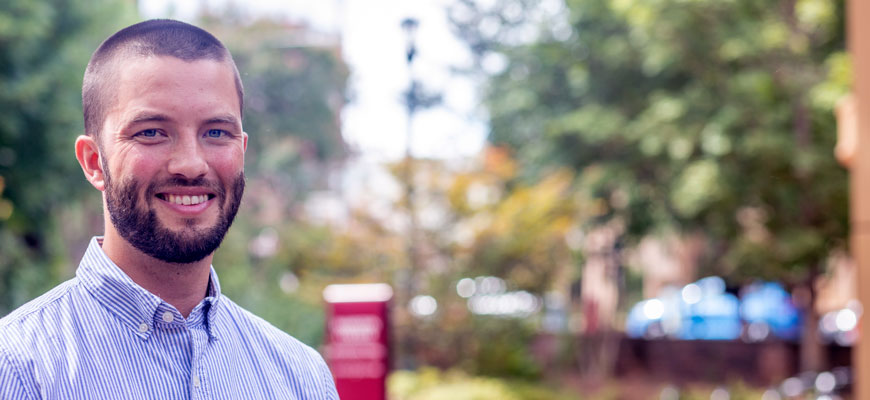
Meet new faculty: John Doering-White
Posted on: November 4, 2019; Updated on: November 4, 2019
By Craig Brandhorst, craigb1@mailbox.sc.edu, 803-777-3681
Hometown: Detroit
Education: Bachelor's degrees in human Development and Social Relations and in Spanish and Hispanic
Studies, Earlham College, Richmond, Indiana; master's degrees and Ph.D. in anthropology
and social work, University of Michigan
Position: Assistant professor with a joint appointment in the College of Social Work and the
anthropology department
How did you wind up at the University of South Carolina? What attracted you here?
The move to South Carolina is definitely different. I have been in the Midwest forever. I grew up in Detroit and Ann Arbor and went to undergrad at Earlham College in Indiana. I did my Ph.D. at the University of Michigan. I worked for two years in an AmeriCorps position in Illinois. So, I’ve done the Midwest tour.
One of the big attractions of the University of South Carolina, and particularly the College of Social Work and the department of anthropology, is the bevy of faculty who work around immigration issues. There’s a really strong core of folks doing work relating to immigration.
When you live with people who are in the midst of migrating, and when you live in the midst of people who are helping those people ... you come to appreciate a more fundamental shared human experience.
John Doering-White
Take us back to your own undergraduate education. How did your experience shape your trajectory?
I had the fortune of working with some really incredible professors in undergrad who gave me a deep passion for what’s possible in academia in terms of intellectual exploration but also applied work, connecting research with real world problems. We were encouraged from Day One to be very directly involved with work outside of the classroom.
What led you to your particular area of research?
I started getting interested in immigration issues as an undergrad. There was a large immigrant community, specifically from Oaxaca, in rural Indiana. That led to my interest in community organizing with immigrants in Illinois. There, I met a lot of people who had recently immigrated from Central America, up through Mexico, hopping freight trains and passing through a loose network of migrant shelters, which are nongovernmental humanitarian spaces that provide short-term relief. Hearing about those shelters was really kind of baffling. How could these places that are essentially facilitating the passage of undocumented immigrants so openly exist?
What was your dissertation?
I applied to graduate school wanting to study new immigrant communities in the Midwest, but I quickly shifted to pursuing a project that would explore the politics of humanitarianism with Central American migrants in Mexico. So, my dissertation was an ethnography based on my time living and working in migrant shelters in Mexico, especially in central Mexico.
That sounds like a pretty intense experience. What did your time in Mexico teach you?
It taught me a lot about the gray zones. When we talk about undocumented immigration, we often talk about it in black and white terms. It tends to be a discussion of “us versus them.” But when you live with people who are in the midst of migrating, and when you live in the midst of people who are helping those people — and I mean helping those people in the most basic ways, providing a bowl of hot food and a place to sleep at night, providing sanctuary and safety — you get beyond that black and white narrative. You come to appreciate a more fundamental shared human experience.
Share this Story! Let friends in your social network know what you are reading about